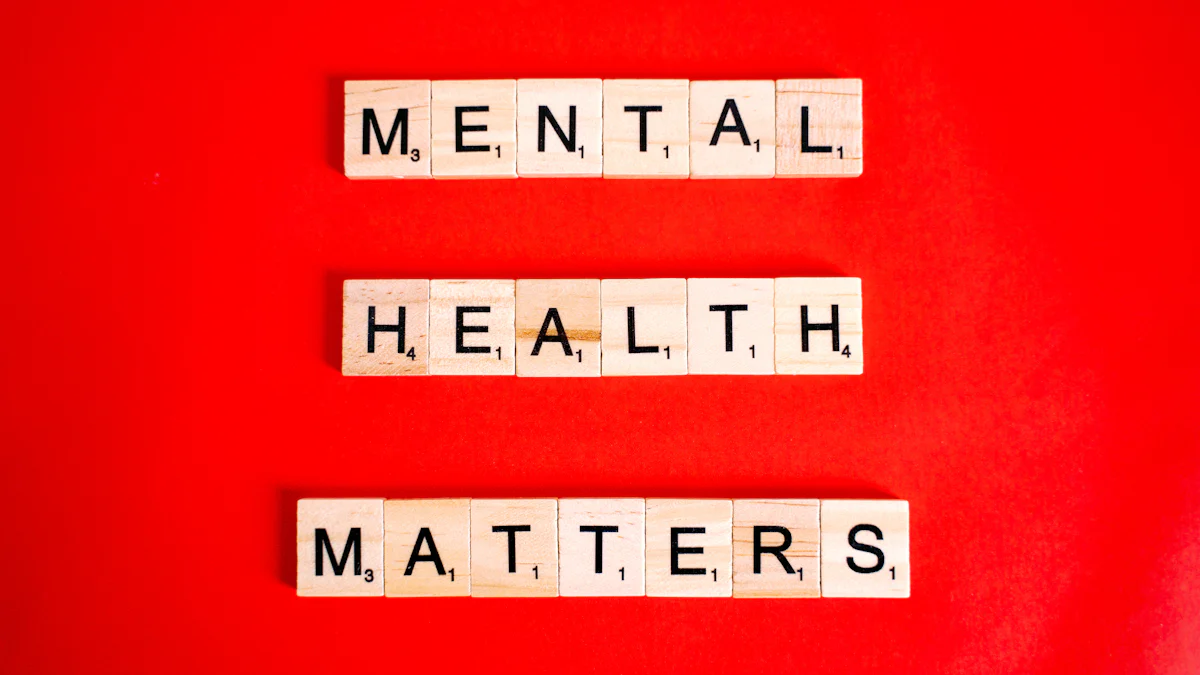Understanding the Mental Health Effects of Online Learning

Online learning has become a cornerstone of modern education. The shift from traditional classrooms to digital platforms has accelerated, especially during the pandemic. In 2020, 74% of higher education students engaged in distance learning, a significant increase from previous years. This transformation offers benefits like flexibility and accessibility, but it also introduces Pandemic Mental Health Risks. Understanding these impacts is crucial. The Centers for Disease Control highlights the importance of addressing mental health challenges in educational settings. This blog aims to explore how Online learning, Self-paced learning, and Stress-free education can affect mental well-being and provide insights into managing these challenges effectively.
The Rise of Online Learning
Historical Context
The evolution of online education has transformed the educational landscape. In the late 20th and early 21st centuries, learning management systems emerged, providing centralised platforms for delivering, managing, and tracking online learning activities. This shift marked a significant change from traditional methods, allowing students to engage in distance learning from the comfort of their homes.
Technological advancements have played a crucial role in this transformation. The internet has enabled students worldwide to access educational courses at their convenience. This development has made education more accessible and flexible, catering to diverse needs and preferences.
Current Trends
The pandemic accelerated the popularity of online learning. During this period, many institutions adopted digital platforms to continue education. This shift highlighted the need for more adaptable curricula, leading to the creation of innovative tools and platforms that enhance the learning experience.
Today, diverse platforms and tools are available, offering various features to support students. From interactive video lessons to virtual classrooms, these resources make online learning more engaging and effective. The Classnotes Podcast often discusses these trends, providing insights into how technology continues to shape education.
Online Learning, Self-paced Learning, Stress-free Education
Online learning offers numerous benefits, including flexibility and accessibility. Students can learn at their own pace, which reduces stress and allows for a more personalised experience. This approach aligns with the principles of the Early Childhood Bilingual curriculum, where flexibility is key to fostering language development.
However, challenges exist. The Effects Of Online Learning on mental health cannot be ignored. Increased screen time and isolation can lead to stress and anxiety. Educators like Christina Muñoz emphasise the importance of balancing online and offline activities to maintain well-being.
The Impact of Online Learning on student life stress is significant. While it offers freedom, it also demands self-discipline. The Classnotes Podcast provides a Comprehensive Guide to managing these challenges, helping students navigate this new educational landscape.
Mental Health Implications

Positive Effects
Flexibility and accessibility
Online learning, self-paced learning and stress-free education offer significant benefits. Students enjoy the flexibility to learn at their own pace, which reduces stress and enhances mental well-being. This approach allows learners to tailor their education to fit their schedules, providing a more personalised experience. The accessibility of online platforms ensures that education reaches a broader audience, breaking geographical barriers and offering opportunities to those who might otherwise be excluded.
Self-paced learning benefits
Self-paced learning empowers students to take control of their educational journey. They can revisit complex topics and progress without the pressure of keeping up with peers. This autonomy fosters a sense of achievement and boosts confidence, contributing positively to mental health. By allowing students to manage their time effectively, self-paced learning supports a balanced lifestyle, reducing the risk of burnout.
Negative Effects
Isolation and loneliness
Despite its advantages, online learning can lead to feelings of isolation and loneliness. The absence of face-to-face interaction deprives students of social connections, which are vital for mental health. Research from the European Proceedings highlights that students often experience increased stress and anxiety due to this lack of social engagement. Educational institutions must offer online mental health support to mitigate these effects and foster a sense of community.
Increased screen time and its consequences
Excessive screen time poses a negative impact on both physical and mental health. Prolonged exposure to screens can lead to eye strain, headaches, and disrupted sleep patterns. These physical symptoms often contribute to mental fatigue and stress. The BMC Public Health journal reports that students facing higher levels of stress during online learning often experience poorer mental health outcomes. Encouraging regular breaks and offline activities can help alleviate these issues.
Psychological distress and depression
Levels of depression
The shift to online learning has been linked to increased levels of depression among students. The lack of boundaries between academic and personal lives often leads to learning fatigue and information overload. These factors contribute to psychological distress, as highlighted by various studies. Students need access to mental health resources to navigate these challenges effectively.
Distress factors in virtual learning
Virtual learning environments can exacerbate stress due to constant connectivity and the pressure to perform. The Environ Res Public Health journal emphasises the importance of addressing these mental health implications. Institutions should provide mental health support and create a balanced educational environment. By prioritising mental health, educators can ensure that students thrive both academically and emotionally.
Research Findings
Studies on Student Well-being
Key findings from recent research
Recent studies have shed light on the impact of online learning, self-paced learning, stress-free education on student well-being. Researchers have found that while these educational methods offer flexibility, they can also lead to increased levels of stress and anxiety. The absence of a structured environment often results in students feeling overwhelmed. According to a study published in the PMC free article, students engaged in online learning reported higher levels of mental health issues compared to those in traditional settings. This highlights the need for educational institutions to provide adequate mental health support.
Statistical analysis and data interpretation
Statistical analysis of data from various studies reveals a significant correlation between online learning and mental health challenges. For instance, a survey conducted by the IDRA Newsletter found that 75% of students experienced stress related to online learning. The data interpretation suggests that the lack of social interaction and increased screen time contribute to these mental health issues. The IDRA Education Policy Fellow emphasises the importance of addressing these challenges through policy changes and support systems.
Comparative Analysis
Online vs traditional learning impacts
The debate between online and traditional learning continues to evolve. Online learning, self-paced learning, stress-free education can lead to increased stress, anxiety, and depression among students. In contrast, traditional learning environments often provide more social interaction and support, potentially reducing mental health issues. The IDRA advocates for a balanced approach that incorporates the benefits of both methods. A study in the PMC free article highlights that while online learning offers flexibility, it may lack the emotional exchanges and peer interactions found in traditional classrooms.
Long-term mental health outcomes
Long-term mental health outcomes vary between online and traditional learning environments. Students in online settings may experience a decreased sense of belonging and increased fatigue. Traditional learning environments, on the other hand, offer more opportunities for social interaction and a sense of community. The Southern Education Equity Network suggests that educational institutions should focus on creating supportive environments that cater to the mental health needs of students. The IDRA Newsletter frequently discusses these issues, providing insights into how schools can adapt to meet the changing needs of students.
PubMed Central Google Scholar
Research methodologies
Research methodologies play a crucial role in understanding the mental health effects of online learning. Studies often utilise surveys, interviews, and observational methods to gather data. The PMC free article database provides access to a wealth of research on this topic. Researchers use these methodologies to explore the relationship between online learning and mental health, offering valuable insights into the challenges faced by students.
Data sources and credibility
Credible data sources are essential for accurate research findings. The IDRA Newsletter and PMC free article serve as reliable resources for researchers exploring the mental health implications of online learning. These platforms offer access to peer-reviewed articles and studies, ensuring that the information is trustworthy. The School Resource Hub and Resource Center also provide valuable data for educators and policymakers seeking to address the mental health needs of students.
Coping Strategies and Recommendations

Online learning presents unique challenges, but students and educators can adopt effective strategies to mitigate mental health impacts. By focusing on time management, building support networks, and incorporating physical activity, individuals can enhance their well-being and engagement in the digital classroom.
For Students
Time management techniques
Students often struggle with managing their time effectively in an online learning environment. They can benefit from creating a structured schedule that mimics a traditional school day. Setting specific times for study, breaks, and leisure activities helps maintain a balanced routine. Utilising tools like digital calendars or planners can aid in organising tasks and deadlines. By prioritising tasks and breaking them into manageable chunks, students can reduce stress and improve their engagement with coursework.
Building a support network
A strong support network plays a crucial role in maintaining mental health. Students should actively seek connections with peers, family, and educators. Joining virtual study groups or forums fosters a sense of community and provides opportunities for collaboration. Educational institutions can facilitate this by creating online hubs where students can interact and share experiences. These hubs serve as valuable resources for student engagement, offering a platform for discussion and mutual support.
For Educators
Creating engaging content
Educators must focus on creating content that captivates students' attention. Interactive lessons, multimedia resources, and real-world applications enhance learning experiences. By incorporating diverse teaching methods, educators can cater to different learning styles and keep students motivated. Regular feedback and assessments help track progress and identify areas for improvement. Engaging content not only boosts student engagement but also contributes to a positive learning environment.
Encouraging interaction and collaboration
Interaction and collaboration are vital components of effective online learning. Educators should encourage students to participate in discussions, group projects, and peer reviews. Virtual classrooms and forums provide platforms for meaningful exchanges. By fostering a culture of collaboration, educators can enhance student engagement and create a supportive learning community. This approach helps students develop essential communication and teamwork skills, preparing them for future challenges.
Physical activity and stress management
Incorporating exercise into daily routine
Physical activity is essential for maintaining mental health. Students and educators should incorporate exercise into their daily routines. The International Physical Activity Questionnaire suggests engaging in at least 150 minutes of moderate-intensity exercise per week. Activities like walking, cycling, or yoga can reduce stress and improve mood. Regular exercise enhances concentration and cognitive function, contributing to better academic performance.
Mindfulness and relaxation techniques
Mindfulness and relaxation techniques offer effective ways to manage stress. Practices such as meditation, deep breathing, and progressive muscle relaxation promote mental clarity and emotional balance. Students and educators can integrate these techniques into their daily schedules to alleviate anxiety and enhance focus. Mindfulness encourages individuals to stay present and engaged, fostering a positive mindset and improving overall well-being.
Future Directions
The future of online learning must address the mental health challenges students face. By focusing on research and policy, educational institutions can create a supportive environment that promotes well-being.
Areas for Further Research
Longitudinal studies
Longitudinal studies offer valuable insights into the long-term effects of online learning on mental health. Researchers should conduct these studies to track changes in student well-being over time. By analysing data from various sources, such as CrossRef Full Text and Google Scholar, they can identify patterns and trends. This approach will help educators understand how online learning impacts mental health and develop strategies to mitigate negative effects.
Diverse demographic impacts
Understanding the diverse demographic impacts of online learning is crucial. Different groups may experience unique challenges and benefits. Researchers should explore these differences using resources like PubMed Abstract and CrossRef Full. By examining factors such as age, gender, and socio-economic status, they can tailor interventions to meet the needs of all students. This research will ensure that online learning platforms are inclusive and equitable.
Policy Implications
Educational policy adjustments
Educational policy adjustments are necessary to support students' mental health. Policymakers should consider the findings from Google and CrossRef studies when designing curricula. They must integrate mental health resources into the education system, as highlighted in the Importance of Mental Health in the Educational System document. By prioritising mental health, schools can create a more holistic learning environment that fosters well-being.
Mental health support initiatives
Mental health support initiatives play a vital role in addressing the challenges of online learning. Schools should implement programmes that provide access to counselling, therapy, and support groups. The Online Learning and Mental Health Support document emphasises the importance of these resources. By collaborating with mental health professionals, educational institutions can offer comprehensive support to students. This approach will help reduce stress and anxiety, promoting a healthier learning experience.
In conclusion, the future of online learning depends on understanding its mental health implications. Through research and policy changes, educators can create a supportive environment that enhances student well-being. By leveraging resources like Google Scholar and CrossRef Full Text, they can develop effective strategies to address these challenges. The integration of mental health support into the education system will ensure that students thrive both academically and emotionally.
Understanding the mental health effects of online learning is crucial. This blog has highlighted both the positive and negative impacts. Online learning offers flexibility and access to mental health resources, yet it can also lead to stress and isolation. Recognising these challenges is vital for creating supportive educational environments.
"Incorporating mental health support into the school curriculum can help reduce student stress levels and improve mental health outcomes."
Stakeholders must take action. Schools should integrate mental health resources and mindfulness techniques into their curricula. By doing so, they can enhance student well-being and ensure a balanced educational experience.
See Also
Overcoming Obstacles in Virtual Learning Environments
Utilizing Diverse Learning Approaches in E-Learning
Resolving Tech Hurdles in Digital Learning Platforms
Assessing Impact of Online Courses on Contemporary Learning
Adaptable Education: Revolutionizing Student Learning Experiences

